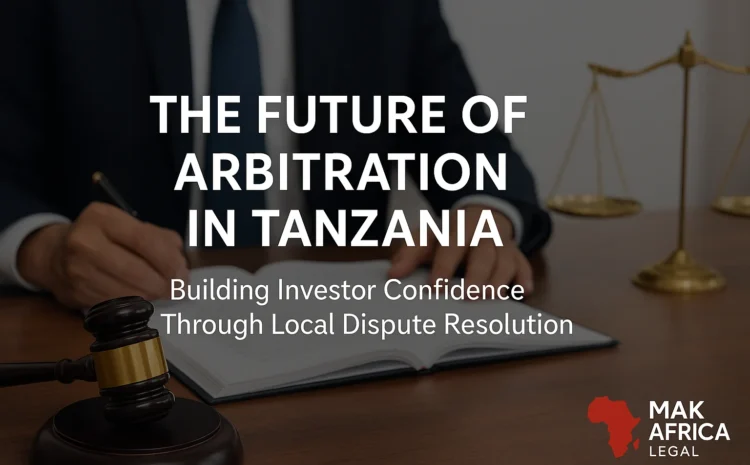
For investors, one of the thorniest issues is not just doing business, but unwinding business if things go wrong. The ability to resolve disputes quickly, fairly and with enforceable outcomes is often a deciding factor in committing capital.
In Tanzania, significant steps are underway to modernize arbitration and alternative dispute resolution (ADR) frameworks to align with global standards, regional trade agreements such as the African Continental Free Trade Area (AfCFTA), and the country’s own development agenda under Vision 2050.
For foreign investors, this evolution means that legal strategy must incorporate where and how disputes are resolved not just what business is done. At Mak Africa Legal, we view the arbitration infrastructure in Tanzania as a key pillar of investment readiness.
The current legal framework for arbitration and mediation
Arbitration Act and institutional reform
Tanzania’s major arbitration reform began with the enactment of the Arbitration Act, 2020 (Act No. 2 of 2020), which replaced the nearly century-old 1931 statute. The new Act came into force on 18 January 2021.
The Act introduced important features:
- The principle of party autonomy (Sections 9–12) enabling parties to select arbitrators or procedures.
- A recognition of the separability of the arbitration agreement (Section 10) and minimum court interference (Sections 13 & 46) — increasing confidence in arbitral autonomy.
- Creation of a statutory entity, the Tanzania Arbitration Centre (TAC) to manage arbitration, maintain accredited arbitrators and govern the institutional framework.
Mediation and ADR “culture”
Beyond formal arbitration, Tanzania is promoting mediation and other ADR mechanisms. For example, the Tanzania International Arbitration Centre (TIAC) recently hosted a training programme “Foundations of Commercial Mediation” for young lawyers in August 2025.
A recent report by the judiciary noted that disputes resolved through ADR rose from 82 in 2023 to 106 in 2024, with continuing growth.
Regional and international context
Tanzania is also influenced by regional frameworks (EAC, SADC), AfCFTA standards and the need for enforceability of international awards. An article analyzing Tanzania’s natural wealth sector argues that new arbitration laws require arbitration to be seated in Tanzania and governed by Tanzanian law for certain disputes, particularly in natural resources.

How these reforms align with Vision 2050 & AfCFTA
Vision 2050 & dispute-resolution reform
Under Vision 2050, Tanzania emphasizes rule of law, institutional strengthening and faster, more reliable dispute-resolution. For example, direct negotiation and special arrangements in PPPs are now legally recognized, and international arbitration is explicitly permitted in PPP act amendments.
This means that for large-scale projects (in mining, infrastructure, energy) structured under Vision 2050, parties can and should anticipate dispute-resolution frameworks that align with international expectations which matters for risk modelling and financing.
AfCFTA and cross-border commerce
Under the AfCFTA, dispute-resolution mechanisms are important for facilitating cross-border trade and investment. Tanzania’s strengthened arbitration framework supports that integration by offering more predictability of outcomes, better enforcement infrastructure and local “seat” options for arbitration.
For foreign investors looking to use Tanzania as hub into East and Central Africa, knowing that arbitration and ADR frameworks are maturing strengthens the legal argument for investing here.
Why investor confidence is improving
Strengths
- Modern arbitration law: the new Act aligns much more closely with international norms, increasing comfort for foreign parties.
- Institutional capacity: the existence of TIAC, TAC and growing training programs for arbitrators and mediators.
- Rising use of ADR: demonstration of actual numbers of disputes resolved through mediation and arbitration shows the system is becoming operational.
Remaining challenges
- Enforcement: While arbitration awards can be made, enforcement in practice, especially against state actors or within regulated sectors, still presents risk. For example, some analyses note that Tanzania’s reform does not yet include full provisions for expert enforcement of awards.
- Seat & governing law constraints in certain sectors: In natural-wealth and resource disputes, Tanzania asserts the seat must be in Tanzania and law must be Tanzanian law, which may limit flexibility for some investors used to international seats.
- Institutional capacity and awareness: Projects note that mediators, arbitrators and legal professionals need continued training and growth of the culture of ADR.
- Overlap with court system and clarity of rules: While the new Act is better, practical details (e-filing, timelines, interim measures) remain under development.

Practical advice for investors and corporates operating in Tanzania
Draft your dispute-resolution clause carefully
- Specify the seat of arbitration (Dar es Salaam is increasingly used through TIAC) and the arbitration rules (TIAC Rules or internationally agreed rules).
- Choose governing law, Tanzania law is often required or preferred in some sectors. For other sectors, ensure your contract accommodates regional or international enforceability.
- Include interim relief and enforcement protections given gaps in enforcement, consider escrow, standby letters or performance security.
- Consider mediation/ADR steps before arbitration building a staged dispute-resolution ladder can demonstrate good faith, reduce cost and preserve relationships.
Use investor-ready legal structuring
- For PPPs and large projects: confirm that relevant legislation allows international arbitration (some PPPs require domestic dispute resolution under Tanzanian law).
- Build escalation clauses and dispute-allocation frameworks tied to risk models — e.g., for mining, energy, infrastructure sectors.
Leverage local arbitration institutions
- Use TIAC or other accredited centres for “seat” of arbitration; this provides a local base and may benefit from cost efficiencies.
Monitor enforcement and regulatory risk
- Conduct due diligence on counterparties’ history of arbitration awards and enforcement in Tanzania.
- For awards in sectors interacting with state-owned enterprises or regulated markets, assess regulatory/regime risk (licensing, revocation, amendments).
- Keep legal budgets for potential arbitration or mediation — even a well-drafted clause means readiness to use it.
Dispute resolution as a strategic asset
In Tanzania, the legal reforms in arbitration and ADR are more than administrative: they are becoming structural enablers of investor confidence. For foreign-invested projects, knowledge-based capital, family-business transfers, joint ventures, PPPs and cross-border commerce, the question is no longer “Can we enter?” but rather “How prepared are we to manage dispute risk?”
At Mak Africa Legal, we help clients design their invest-ready dispute-resolution architecture: clauses, strategic escalation, enforcement readiness and local-institution alignment. If you want to enter Tanzania or scale operations here, the arbitration and ADR framework should be part of your core legal strategy not an afterthought.
📧 info@makafrica.com
📞 +255 746 954 394
Mak Africa Legal – Dispute-Resolution Strategy for Tanzania’s Investment Future
